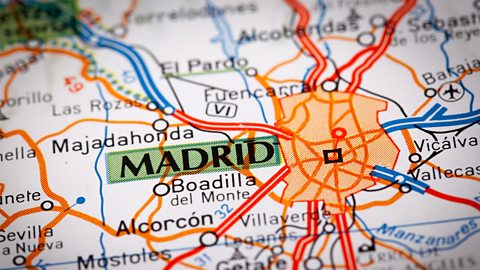How to use genders and articles in Spanish.
In Spanish, every noun has a gender.
They’re either masculine or feminine.
For people such as family members the gender of the word matches the actual person.
Madre is feminine and padre is masculine.
Most masculine nouns end in -o, like hermano, meaning 'brother' and most feminine nouns end in -a, like hermana, meaning 'sister'.
That pattern works for things too.
El teléfono is masculine.
La guitarra is feminine.
El and la both mean the.
El is for masculine nouns - el perro.
And if there’s more than one, el becomes los - los perros, ‘the dogs’.
La is for feminine nouns - la casa and if you have more than one, la becomes las - las casas - ‘the houses’.
Un and una, the ‘a’ or ‘an’ in Spanish, change depending on the gender of the noun.
Un tenedor but una manzana.
Un and una can be plural too, to mean 'some'.
Unos tenedores or unas manzanas.
Try to remember the gender when you are learning new nouns and then you’ll know the right words for ‘the’ and ‘a’ too!
Nouns in Spanish
A noun is a person, place or thing.
All nouns in Spanish have a gender. That means they are either masculine or feminine.
As in English, some nouns already have a clear gender.
For example:
hermano (brother) is masculine
hermana (sister) is feminine
Although it might seem strange at first that nouns have a gender in Spanish, there are luckily lots of patterns and clues to help you to remember if a noun is masculine or feminine.
Masculine nouns
Most nouns that end in -o are masculine.
For example:
el teléfono - telephone
el perro - dog
Male family members are always masculine.
For example:
hermano - brother
padre - father
Days of the week and months are also masculine.
For example:
lunes - Monday
diciembre - December

Remember that days of the week and months are not written with a capital letter in Spanish.

Feminine nouns
Most nouns that end in -a are feminine.
For example:
la casa - house
la pierna - leg
Female family members are always feminine.
For example:
hermana - sister
madre - mother
There are also some groups of endings that are always feminine.
For example:
-ión - estación - station
-dad - universidad - university
-tad - dificultad - difficulty
There are some exceptions to the rule that you will need to remember
Some nouns that end in -a are masculine, typically those ending in -ma and -pa.
For example:
tema - topic
problema - problem
mapa - map
Some nouns that end in -o are feminine.
For example:
radio - radio
mano - hand

Plural nouns
Nouns in Spanish can also be either singular or plural.
For example:
perro - dog
perros - dogs
caramelo - sweet
caramelos - sweets
There are different ways of making a noun plural.
If a noun ends in a vowel, add -s.
For example:
un chico - one boy
dos chico_s_ - two boys
If a noun ends in a consonant, add -es.
For example:
un jardín - one garden
dos jardin_es_ - two gardens
If a noun ends in -z, change the z to c and add -es.
For example:
un lápiz - one pencil
dos lápi_ces_ - two pencils
If a noun ends in -ión, add -es and drop the written accent.
For example:
una estación - one station
dos estaciones - two stations
Now look again at the information above. Both the words jardín and estación lose their written accents when you make them plural.
This is because any word in Spanish that has a written accent on its last vowel and ends in -n, -s or a vowel loses the accent when you make it plural.
The definite article
The definite article is the word for ‘the’.
There are four different definite articles in Spanish.
masculine singular
- el - el chico - the boy
feminine singular
- la - la chica - the girl
masculine plural
- los - los chicos - the boys
feminine plural
- las - las chicas - the girls
If the plural noun refers to a mixed group, use the masculine version of the word.
For example:
los padres - the parents
los hermanos - the siblings (brothers and sisters)
The indefinite article
The indefinite article is the word for ‘a’ (or ‘an’) or ’some’.
There are four different indefinite articles in Spanish.
masculine singular
- un - un hermano - a brother
feminine singular
- una - una tía - an aunt
masculine plural
- unos - unos coches - some cars
feminine plural
- unas - unas camas - some beds
If the plural noun refers to a mixed group, use the masculine version of the word.
For example:
- unos hermanos can mean both ‘some brothers and sisters’ (siblings) or ‘some brothers’.
Have a go at this activity and see how much you know about genders and articles in Spanish.
Quiz
Find out how much you know about genders and articles in Spanish with this short quiz!
More on Grammar
Find out more by working through a topic